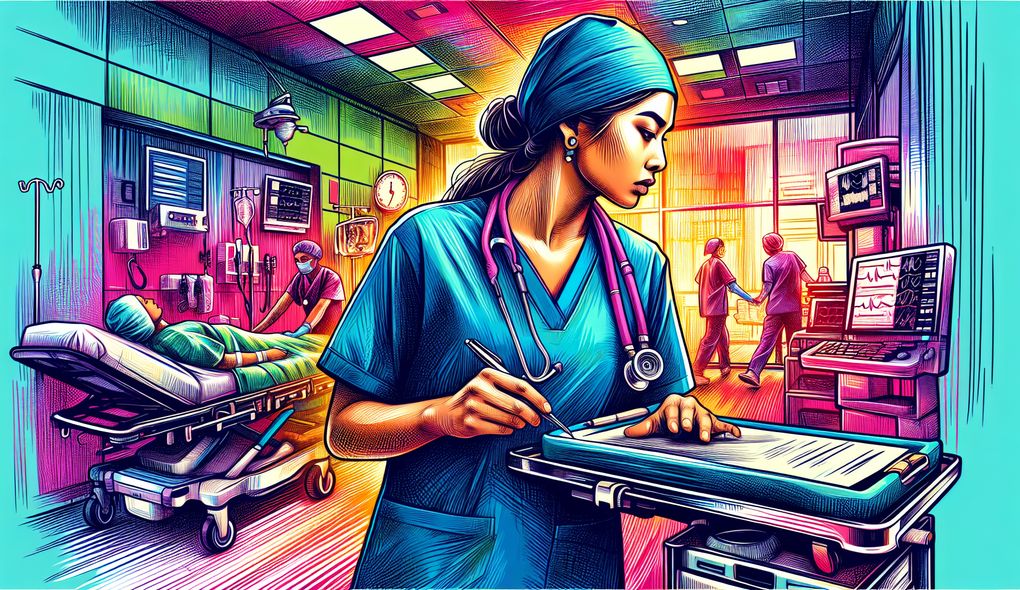How do you handle high-stress, high-stakes situations in the emergency department?
INTERMEDIATE LEVEL

Sample answer to the question:
In high-stress, high-stakes situations in the emergency department, I rely on my strong clinical skills and ability to stay calm under pressure. I prioritize and triage patients based on the severity of their condition, ensuring that the most critical cases receive immediate attention. I effectively communicate with the multidisciplinary team, including nurses, paramedics, and ancillary staff, to coordinate patient care. I am proficient with electronic medical record (EMR) systems, which helps me quickly access patient information and make informed decisions. Additionally, I actively participate in continuous medical education and training to stay updated with advancements in emergency medicine.
Here is a more solid answer:
Handling high-stress, high-stakes situations in the emergency department requires a combination of clinical expertise, effective communication skills, and the ability to make critical decisions under pressure. In my experience, I have developed strong clinical skills through years of working in emergency medicine. This enables me to quickly assess and diagnose patients with urgent medical problems. To manage the stress of the environment, I prioritize tasks, communicate effectively with the multidisciplinary team, and adapt my approach based on the severity of each case. I am proficient with EMR systems, which allows for efficient documentation and access to patient information. Additionally, I actively engage in continuous medical education to stay updated with the latest advancements in emergency medicine, ensuring high-quality care for patients.
Why is this a more solid answer?
The solid answer expands on the basic answer by providing specific examples of how the candidate handles high-stress situations. It mentions years of experience in emergency medicine, strong clinical skills, effective communication, and the ability to adapt in a dynamic environment. The answer also addresses the proficiency with EMR systems and a commitment to continuous learning. However, it could still be improved with more details and specific examples to demonstrate the listed evaluation areas.
An example of a exceptional answer:
In the emergency department, high-stress, high-stakes situations demand a combination of clinical expertise and effective teamwork to provide optimal care to patients. As an experienced Emergency Medicine Physician, I have honed my clinical skills, allowing me to quickly assess and treat patients in critical conditions. I prioritize patients based on the severity of their conditions and collaborate seamlessly with the multidisciplinary team to coordinate care. In one particular instance, a trauma patient arrived with multiple life-threatening injuries. Despite the intense pressure, I remained calm and directed the team to perform life-saving measures. By keeping up-to-date with advancements in emergency medicine, such as attending conferences and workshops, I continuously enhance my decision-making abilities. Moreover, I understand the importance of debriefing after high-stress situations to promote self-reflection and growth. My commitment to patient safety and high-quality care drives me to deliver exceptional performance even in the most challenging circumstances.
Why is this an exceptional answer?
The exceptional answer goes into great detail about the candidate's capabilities in handling high-stress situations. It showcases their clinical expertise, ability to prioritize patients, and effective teamwork skills. The inclusion of a specific example demonstrates their ability to remain calm and lead the team during a critical incident. The answer highlights the candidate's commitment to continuous learning and their dedication to patient safety and high-quality care. Overall, this answer provides comprehensive and detailed information that aligns with the key evaluation areas mentioned in the job description.
How to prepare for this question:
- Reflect on past experiences in the emergency department where you successfully handled high-stress situations. Be prepared to discuss specific examples and highlight your decision-making abilities.
- Highlight your ability to effectively communicate and collaborate with a multidisciplinary team in high-stakes situations. Discuss how you prioritize tasks and coordinate care to ensure optimal patient outcomes.
- Demonstrate your proficiency with electronic medical record (EMR) systems and emphasize the importance of accurate and efficient documentation in fast-paced environments.
- Showcase your adaptability and resilience by discussing how you handle constant changes and evolving patient needs in the emergency department.
- Explain how you prioritize patient safety and your commitment to providing high-quality care even in high-stress situations. Discuss any practices or strategies you employ to ensure patient safety.
What are interviewers evaluating with this question?
- Strong clinical skills
- Ability to work effectively in a high-stress environment
- Excellent interpersonal skills
- Critical thinking and decision-making skills
- Proficient with electronic medical record (EMR) systems
- Adaptability and resilience
- Commitment to patient safety and high-quality care

